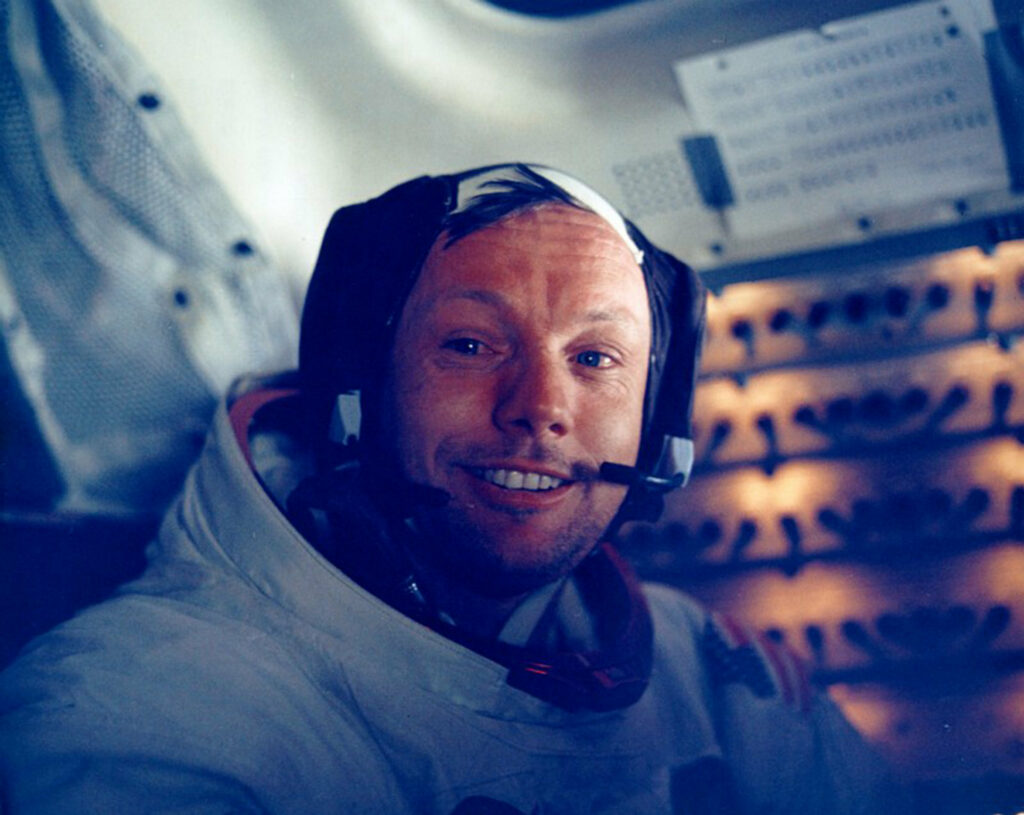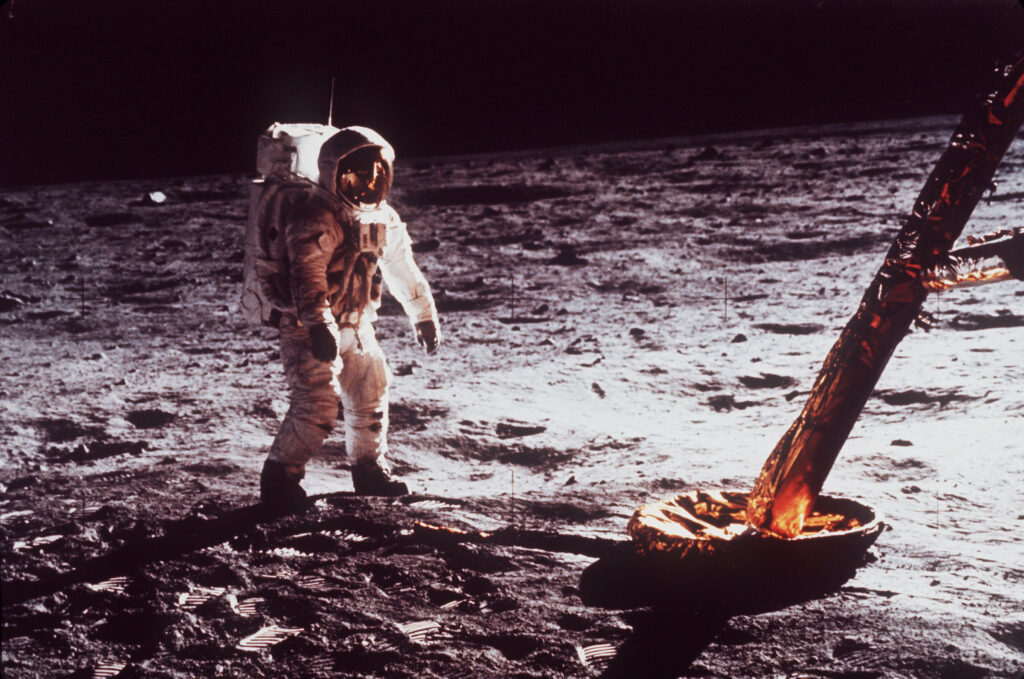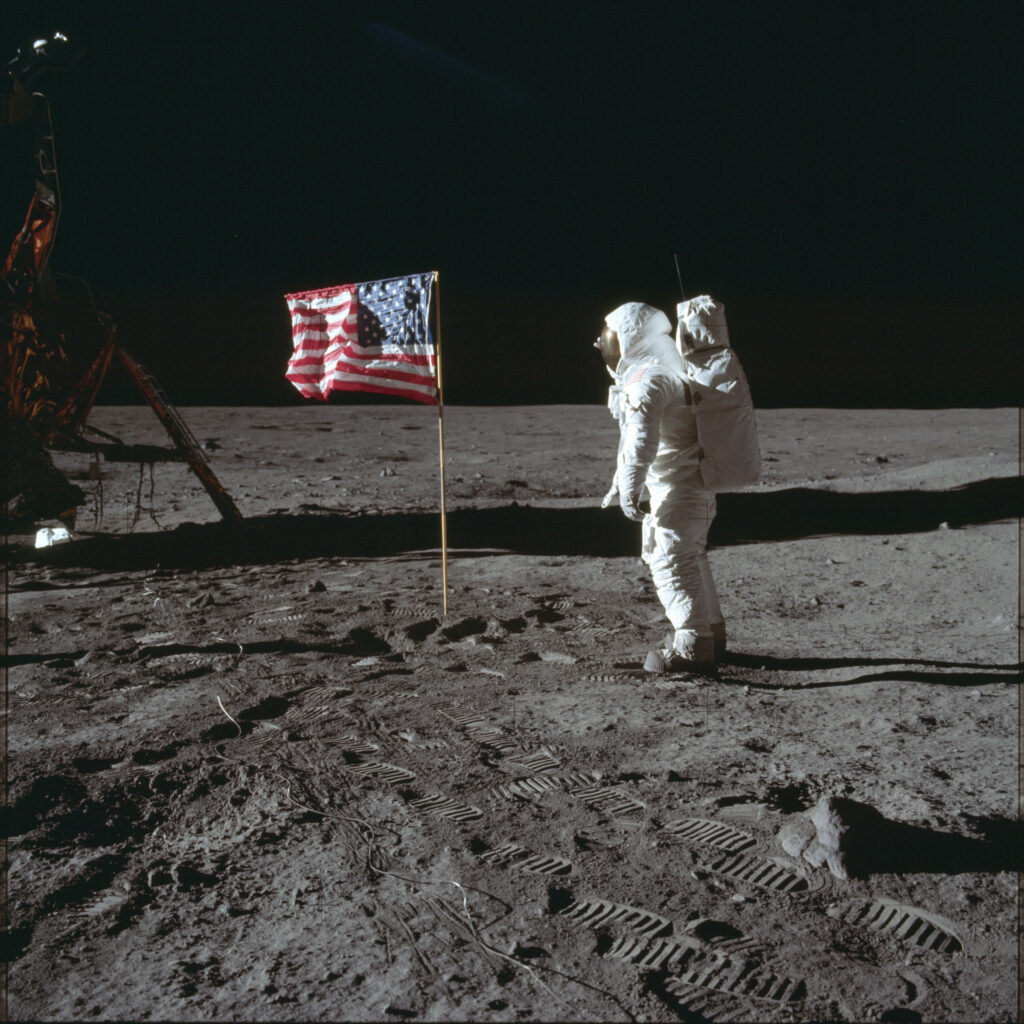BY HOWARD COHEN, MIAMI HERALD
Long before playlists were a thing, the astronauts aboard Apollo 11 chose their favorite tunes to listen to on the space flight and for their historic moon walk.
As the 50th anniversary of Neil Armstrong, Buzz Aldrin and Michael Collins’ moon landing on July 20, 1969, approaches, it seems everyone is suggesting a moon-oriented Spotify playlist. These are filled with the usual suspects that mention the moon or are about space flight.
Naturally, that means Elton John’s “Rocket Man,” David Bowie’s “Space Oddity,” The Police’s “Walking on the Moon,” Frank Sinatra’s “Fly Me to the Moon” and Zager & Evans’ trippy “In the Year 2525” — which was actually No. 1 on the national music charts throughout July 1969, the week man flew to, and first walked, on the moon.
But only one of those songs actually was played by Apollo 11’s astronauts on their moon mission. (Nothing against Elton or the Police, but their spacey tunes were still light years away.)
Vanity Fair tracked down the man behind the primitive playlists — we’d call them “mixtapes,” but even that term didn’t seem part of the pop culture lexicon until the 1980s.
According to Vanity Fair, Mickey Kapp, son of the founder of Kapp Records, was pals with some of the astronauts. He was chosen to compile the songs onto cassettes the astronauts said they wanted to hear en route to and from the moon. They wanted to hear their favorite tunes.
The audio cassette was still a relatively new format 50 years ago when popular music was defined by the Beatles, Rolling Stones and Simon & Garfunkel, but its compact size — smaller than the portable 8-track tape cartridge — made it an ideal sound vessel for space travel.
NASA began equipping astronauts with small Sony TC-50 cassette recorders — similar to the portable stereo Walkman, which would hit the world in 1979 — for the Apollo 7 mission in October 1968. The idea was so that they could log mission notes more easily than scribbling onto paper. But they could also use the cassette players for entertainment.

NASA / TNS
Neil Armstrong smiles aboard Apollo 11 in July 1059.
Apollo 11 soundtrack
Here’s what Kapp said Armstrong, Aldrin and Collins asked him to provide for the Apollo 11 mission — a taste of their “Astro Mix Tapes,” as Vanity Fair dubs the recordings.
“Fly Me to the Moon,” Frank Sinatra
The swinging 1964 Sinatra version recorded with Count Basie and arranged and conducted by Quincy Jones, was already a favorite of NASA space missions. “Old Blue Eyes’” “Fly Me to the Moon” was played on the Apollo 10 mission to the moon in May 1969 — a test run, if you will, for Armstrong and Aldrin’s actual walk on the moon two months later.
But the Sinatra recording became immortal when Aldrin played it off of his NASA issued cassette player when he stepped onto the moon’s surface shortly after Armstrong.
“The first music played on the moon. I freaked!” Jones told The New York Times in 1990, recounting how Aldrin surprised him at a party to tell him how he’d chosen ‘Fly Me to the Moon’ as the soundtrack for his space walk.
“Galveston,” Glen Campbell
Aldrin was clearly into what Billboard charted as “easy listening” music back then. Or, the tunes your dad played on the record player console in the family den. Among his picks: this Jimmy Webb-written classic by Campbell, which hit No. 1 on Billboard’s Easy Listening chart soon after its February 1969 release.
Webb has said “Galveston,” was written as an anti-war song when protests of the Vietnam War during President Nixon’s first administration were building to a crescendo.
Campbell’s catchy, string-laden version, with its toned-down altered lyrics, was often perceived as a patriotic song, about a soldier missing his woman back home in the Texas city.
Aldrin’s from New Jersey but clearly he must have responded to the Campbell sentiment in lines like “Galveston, I am so afraid of dying/Before I dry the tears she’s crying/Before I watch your sea birds flying in the sun, at Galveston.”
“People,” Barbra Streisand
Another Aldrin selection, this ballad was composed by Jule Styne and Bob Merrill for the 1964 Broadway musical “Funny Girl” that made its lead star — Streisand — “the greatest star.”
And as Aldrin and his compatriots stared out at the stars in lonely, cold and quiet space, the song’s need for human connection — “People who need people are the luckiest people” — had to resonate in the Apollo 11 spacecraft. Even on its mono recording.
“Mother Country,” John Stewart
Stewart, fresh out of The Kingston Trio, had released his seminal folk album, “California Bloodlines,” in May 1969, a scant two months before Apollo 11’s blast off and seemingly too soon to catch the attention of busy astronauts prepping for a dangerous mission in space.
But somehow, Aldrin heard and liked the album’s seventh track, buried on side two of the original vinyl LP.
“Mother Country” is an affectionate ode to America during a tumultuous period — Stewart toured on presidential candidate Bobby Kennedy’s campaign trail, which ended when President John F. Kennedy’s brother was killed in 1968. Stewart’s baritone voice on the song was playing on the astronauts’ Sony TC-50 cassette recorder on their return to Earth.
Producers of CNN’s acclaimed new documentary film, “Apollo 11,” heard the faint, scratchy sound of Stewart’s tune playing on the space craft amid the mission’s aural and visual footage and sought permission from Stewart’s widow, Buffy Ford Stewart, to include “Mother Country” in “Apollo 11,” Collect Space reported.
Stewart, fascinated by space travel, was the unofficial songwriter for NASA and he paid tribute to the historic moon walk with his 1969 song, “Armstrong.”
On the 25th anniversary of Apollo 11, Stewart released a seven-track EP he called “Armstrong.” The collection featured a re-recording of the title tune tribute, along with NASA sound clips that included Armstrong’s “One Small Step” transmission to Earth upon setting foot on the moon on July 20.
Stewart’s “Armstrong” EP opens with a two-minute piece of President Kennedy’s “Vision” speech in which he laid out his long-term goal for a safe moon landing and return to earth by the end of the decade. JFK delivered that sound bite on May 25, 1961.
Kennedy’s rival for the White House on that 1960 campaign — President Richard Nixon — got to deliver the congratulatory phone call to Armstrong, Aldrin and Collins on July 20, 1969.
“Three o’ Clock in the Morning,” Lou Rawls
Aldrin was an ol’ romantic, even at age 35 when velvet-voiced Rawls released this sweet ode to a loved one in 1965.
“It’s three o’clock in the morning/We’ve danced the whole night through/And daylight soon will be dawning/Just one more waltz with you/That melody so entrancing/Seems to be made for us two/ I could just keep on dancing forever, dear, with you.”
“Angel of the Morning,” Bettye Swann
Most people probably know the popular versions of songwriter Chip Taylor’s “Angel of the Morning” through Merrilee Rush’s 1968 hit recording or Juice Newton’s Top 5 country-pop crossover smash in 1981.
But this 1969 version by singer Bettye Swann, which “bubbled under” the Billboard Hot 100, was the Apollo 11 choice.
“Spinning Wheel,” Blood Sweat & Tears
“Spinning Wheel,” with its catchphrase “What goes up/Must come down,” must have been wishful thinking for the NASA flight crew back in Houston and the three men making history on their three-day, 238,000-mile journey to the moon and back.
The week after splashdown, the jazz-rock crossover group’s eponymous “Blood Sweat & Tears” album returned to No. 1 on The Billboard 200 chart — dethroning the Broadway cast recording of “Hair,” which was No. 1 when man first walked on the moon.
The breakthrough hit from “Hair?” The out-there “Aquarius/Let the Sunshine In,” a fixture on space missions for years to come.
“Mist of the Moon — Music Out of the Moon” and “Moon Moods,” Dr. Samuel J. Hoffman, Harry Ravel and Lex Baxter
Armstrong’s taste for exotica was revealed in high fashion when he took along a, well, weird album titled “Music Out of the Moon: Music Unusual Featuring the Theremin — Themes by Harry Revel” with him on board Apollo 11.
The music, recorded by bandleader Baxter and released by Capitol Records in April 1947, was an amalgam of late 1940’s lounge jazz and orchestral film music cut with Hoffman’s otherworldly playing of the electronic theremin instrument.
According to Deseret News, mission control in Houston heard Armstrong playing ‘Moon Moods’ on Apollo 11, “and thanked him for turning it off.”
“Everyday People,” Peggy Lee
The world was grooving to R&B superstar Sly Stone’s “Everyday People” for months after its November 1968 release. But maybe it was just a bit too gritty for the astronauts’ personal tastes. Still, they apparently couldn’t resist its melody as this cover by song stylist Peggy Lee found its way onto their Sony (pre-Walkman) cassette player.
“Everybody’s Gone to the Moon,” Jonathan King
Michael Collins chose this descriptive song by King, a British singer-songwriter, who brushed the American Top 20 with the hit in 1965. Nina Simone, Doris Day, Percy Faith and the Flaming Lips all had a go at “Everybody’s Gone to the Moon, but Apollo 11 sent it into the stratosphere.

ASSOCIATED PRESS / NASA
Astronaut Buzz Aldrin walks by the footpad of the Apollo 11 Lunar Module in July 1969.
Future moon mission music
Meantime, in June, NASA initiated a social media challenge, asking the public to suggest songs for a moon tunes road trip playlist — #NASAMoonTunes, for a planned return to the moon in 2024.
NASA, in tandem with its science educational component Third Rock Radio, set the same time frame for submissions that coincided with the period one month out that Apollo 11 astronauts used to prepare for their trek 50 years ago.
Apparently, contemporary astronauts may bop on the moon to South Korean boy band BTS rather than Sinatra, Streisand and Stewart.

Caitlin Heaney West is the content editor for Access NEPA and oversees the Early Access blog in addition to working as a copy editor and staff writer for The Times-Tribune. An award-winning journalist, she is a summa cum laude graduate of Shippensburg University and also earned a master’s degree from Marywood University. Caitlin joined the Times-Shamrock family in 2009 and lives in Scranton. Contact: cwest@timesshamrock.com; 570-348-9100 x5107; or @cheaneywest



